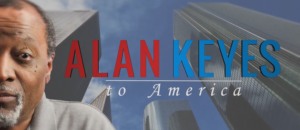Reaping what we sow
By Alan Keyes
July 28th, 2001
The tragic circus of our national "deliberation" about the use of human embryos for medical research goes on. It is difficult to pick the true low point, but the attempts of senators to discover biblical support for killing embryos by arguing that it is the womb which supplies the "breath of life" of Genesis was surely a strong candidate.Meanwhile, in short remarks to President Bush, Pope John Paul II laid out with clarity and wisdom the principles that any decent American must follow in thinking about this issue. It was a remarkable moment, the aging, infirm and utterly focused pope reminding, as a foreigner, the young, healthy but visibly agonized president of the American republic of the truths which the president ought, more than any other man on earth, to make his constant and habitual concern. The caption of the meeting might be, "It's the founding principles, Mr. President."
What did the pope tell the president? It is worth going over in some detail. First, he "express[ed] heart-felt good wishes that your presidency will strengthen your country in its commitment to the principles which inspired American democracy from the beginning, and sustained the nation in its remarkable growth." What better job description could be given of the presidency than this? Above all the particular challenges of policy and politics, the mandate of any president is to strengthen the commitment of the nation to the principles that are its soul, that breathed life into the Republic at its conception and have sustained that life through centuries of sometimes difficult growth and development.
The pope went on to make explicit that the founding principles of the American republic remain the core of our national capacity to govern ourselves in new situations and difficulties. "These principles," he said, "remain as valid as ever as you face the challenges of the new country opening up before us." There is quiet authority in these words, spoken as they are by a man whose own job gives him some experience in turning to principles of eternal validity for ever-fresh answers to the travails of human life.
But what does the pope understand the founding principles of America to be? "Your nation's Founders," he told the president, "conscious of the immense natural and human resources with which your land has been blessed by the Creator, were guided by a profound sense of responsibility towards the common good to be pursued in respect for the God-given dignity and inalienable rights of all." (Emphasis added.)
Are these not the elements of the greatness of our founders? First, their keen awareness, which in retrospect we are tempted to take for granted, that the extraordinary blessings of time, place and opportunity in which they acted obliged them to conduct their affairs in imitation of the Creator's care itself. Truly it was a New World, from the hand of God. There was an unlimited expanse of material possibility. Even more, there was the striking opportunity, derived from a confluence of historical, philosophical and other circumstances, to consider human nature itself afresh and in wonder at its reflection of divinity. Our founders knew that they were acting for all mankind, and under the eye of God, in a moment of opportunity that would not come again.
To this "profound sense of responsibility towards the common good" the Pope links the Founders' understanding that the path to the common good must be that of "respect for the God-given dignity and inalienable rights of all." The common good and the benefit of the majority at the expense of the minority are easily confused, after all. And it was the distinguishing insight of the American founding that the acid test of true pursuit of the common good is precisely whether or not the majority accepts the constraint on its will that the equal dignity of all imposes. Benefits to the many at the expense of the dignity of the few are no part of the common good they are the seized private goods of a selfish, if numerically superior, mob. On behalf of the American people, and in a work ratified by that people, our founders undertook to commit all American majorities to forswear such seizure, and to work instead for the true common good of all God's human creatures placed by His providence in the American nation.
The pope continued by reminding the president that these principles have, in fact, guided American actions throughout our history, including the noble history of American defense of civilization itself, at uncounted and uncountable cost. "America continues to measure herself by the nobility of her founding vision in building this society of liberty, equality and justice under the law. In the century which has just ended, these same ideals inspired the American people to resist two totalitarian systems, based on an atheistic vision of man and society."
American statesmanship, and American citizenship, have from the beginning and throughout our history been governed on the ground, and particularly when the stakes were highest, by the exalted principles of the founding. Here is no theoretical regime of moral sentiments, unrelated to the "practical" business of national life. America "continues to measure herself" by our great "founding vision," and we know that our nation is more, not less, practical in precisely the measure that we make that vision a reality.
It is a great history, and a great heritage. And the pope moves on to remind the president that America bears a correspondingly great responsibility to apply the truth of our founding and our history to the challenges before us today. American devotion to this truth must be refounded in every generation, or the regime will crumble. With it, in this age of universal retreat from the moral truths recognized by past generations, may well crumble the possibility of civilized life anywhere in the world. The world, as the pope reminded the president, is watching us in the hope that we will stem the tide of decay.
Among "area(s) in which political and moral choices have the gravest consequences for the future of civilization," the pope turns to that which "concerns the most fundamental of human rights, the right to life itself." Then, in a chilling sentence, he traces the erosion of decency, the evaporation of the invisible barriers to evil, the collapse of restraint in the powerful, "Experience is already showing how a tragic coarsening of consciences accompanies the assault on innocent human life in the womb, leading to accommodation and acquiescence in the face of other related evils, such as euthanasia, infanticide and, most recently, proposals for the creation for research purposes of human embryos, destined to destruction in the process."
This is the context in which President Bush should be deliberating over the question of embryonic stem cell harvesting. These are the stakes, dwarfing any promised "medical advances", themselves dependent in a score of ways on the continuance of decent society, which the statesman of wisdom and integrity will weigh. The president of a medical research company may indeed have to wrestle with tough choices of resource allocation, as he decides which remedies to pursue and at what cost in dollars and scientific expertise. The president of the United States allocates a more precious resource than money or scientific man-hours, the moral capital of the greatest and best nation history has seen. He has no business spending that capital in the pursuit of new medicines for the body at the expense of our national soul.
To this point John Paul, more gently than I, now turns. "A free and virtuous society, which America aspires to be, must reject practices that devalue and violate human life at any stage from conception until natural death. In defending the right to life, in law and through a vibrant culture of life, America can show a world the path to a truly humane future in which man remains the master, not the product of his technology."
Indeed. And the pope's final words are spoken to the one American chiefly responsible for ensuring that America does show this path to the world:
Mr. President, as you carry out the tasks of the high office which the American people have entrusted to you, I assure you of a remembrance in my prayers. I am confident that under your leadership, your nation will continue to draw on its heritage and resources to help build a world in which each member of the human family can flourish and live in a manner worthy of his or her innate dignity. With these sentiments, I cordially invoke upon you and the beloved American people, God's blessings of wisdom, strength and peace.
As the servile static in Washington reaches a crescendo, we can at least be confident that the president has heard the truth directly from a source he cannot dismiss as one more practitioner of transactional politics. For the president, as for the country from its founding, the path of truth has been made clear. What remains is to choose for or against respecting the dignity of the least among us, in the knowledge that as we sow, so shall we reap.
Originally published at WorldNetDaily.


 Alan Keyes to America
Alan Keyes to America
